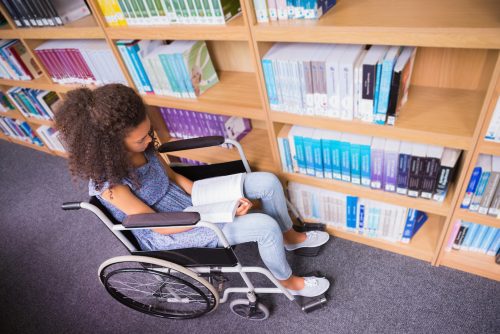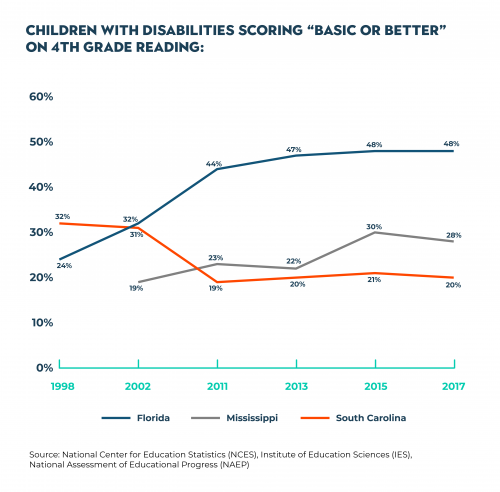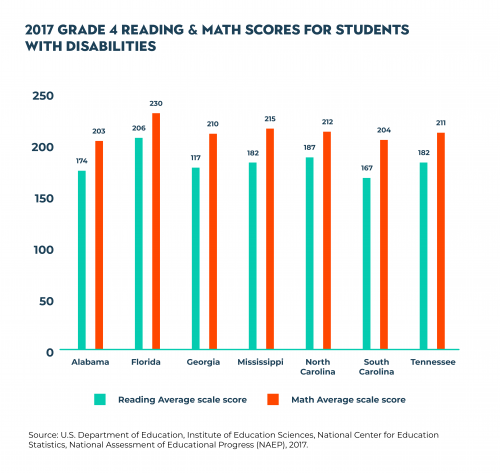South Carolina’s disabled students being left behind
Dropping test scores for students with disabilities cast another shadow on South Carolina’s education system. The National Assessment of Education Progress (NAEP), otherwise known as The Nation’s Report Card, reveals that education outcomes for South Carolina’s special needs students have worsened considerably over the past 20 years. It’s especially telling when you compare South Carolina’s trajectory to nearby states.
Palmetto Promise has gathered test scores from neighboring states Florida and Mississippi and a quick comparison between these states is cause for concern. At one time, South Carolina students with a disability were scoring 8 percentage points higher than their Florida peers and 12 percentage points higher than similar students in Mississippi.
Sadly, our eighth-grade reading and math scores decline along a similar slope. And it’s not just Florida and Mississippi that are getting better results. It’s the entire Southeast. In 2017, students with disabilities in Alabama, North Carolina, Georgia and Tennessee all achieved better 4th grade reading scores than those in South Carolina, and only Alabama had worse outcomes for 4th grade math.
South Carolina needs reform. Remarkably, states like Florida and Mississippi are achieving their results while spending less money per pupil than South Carolina. Florida’s per pupil expenditures average at $9,075, and Mississippi’s at $8,771, in contrast to South Carolina’s average of $10,590 per student. In fact, all the states in the graphic above spend less per pupil than the Palmetto State. Student outcomes in South Carolina are not due to a lack of spending or effort, but, in large part, to a lack of innovation.
However, all is not bad news. Some progress has been made on behalf of students with special needs, providing a solid foundation for continued reform. Recent improvements include the Exceptional SC scholarship fund and the Parental Refundable Tax Credit, both of which give parents greater decision-making freedom for their students’ education.
Created by the state in 2013, Exceptional SC is a 501 (c)(3) organization that channels donations of state tax liability to scholarships for students with disabilities. The fund disburses awards to accepted applicants for use at approved private schools. Capped at $12 million annually, the scholarship fund benefitted 1,951 students in 2017. Allowing similar flexibility, the refundable tax credit allows for the reimbursement of private school tuition to the parents of qualifying students. Capped at two million dollars for the state, the credit covers up to $11,000 in tuition costs per student and funded 508 students in 2017.
These programs recognize that students with disabilities need freedom to find the best educational fit. However, they serve a tiny percentage of the almost 90,000 students with exceptional needs in South Carolina.
While Exceptional SC and the Tax Credit Scholarship are both steps in the right direction, an Education Scholarship Account (ESA) would provide parents of special needs students more flexibility in how their child is educated. At no extra taxpayer expense, students with disabilities could use funds for approved purposes such as school tuition, or to pay for tutors, textbooks, or therapy.
Stories out of states including Florida, Mississippi, and Arizona show the workability of ESAs and the positive impact they can have in the life of a family with a child with special needs. Education Scholarship Accounts have proven effective because they are based on simple principles: the educational needs of each student are unique, and parents are in the best place to gauge them. These principles are especially true for students with disabilities, and it is time that they be given the opportunity to thrive.
And that’s exactly what bold Education Scholarship Account bills like Representative Shannon Erickson’s (H.3681) and Senate Majority Leader Shane Massey’s (S.556) would do. This legislation received subcommittee hearings in both the House and Senate this Spring – we will keep you updated on its progress.
As test scores slip, it is the students who suffer. Simple solutions like a flexible education delivery system can turn their story into a success.








